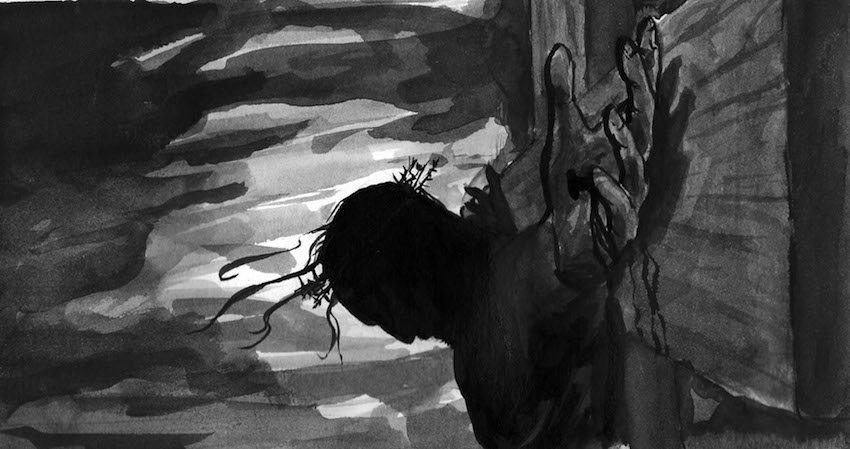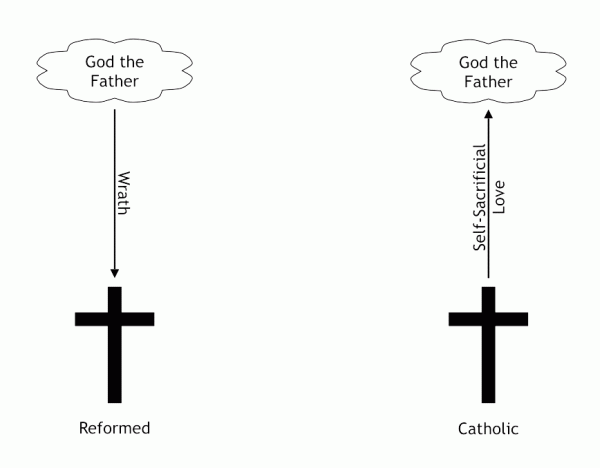PWJ: S1E11 – MC B2C4 – “The Perfect Penitent”


Welcome to the penultimate chapter in Book II! In this episode we look at Jesus’ sacrifice on the cross. How did it save us? How have different Christians tried to explain it? Do we need to understand the mechanics of how it works in order to be saved? These questions and more will be discussed on this episode of “The Eagle and Child”, so pull up a chair and raise your glass. Cheers!
If you enjoy this episode, you can subscribe manually, or through a service like iTunes, Google Play, Podbean, Stitcher and TuneIn. As always, if you have any objections, comments or questions, please send us an email through my website or tweet us @pintswithjack.
Episode 11: “The Perfect Penitent” (Download)
Audio Player
— Show Notes —
• My outline for this chapter is available here. Unfortunately, no Doodle this week!
• This episode attempts to answer two questions:
1. Why did God become man?
Matt describes this in terms of “invading enemy-occupied territory”, which is language used by Lewis in the next chapter, Chapter 5: “The practical Conclusion.
2. What did the death and resurrection of Jesus do for us?
• Today we were drinking Ballast Point Bonito. If this beer is unacceptable to you, please tweet us @pintswithjack with recommendations…or better yet, send us beer!
• Why did Jesus come 2,000 years ago? Many people would say that He came to earth to teach but, as Jack points out, the New Testament seems to focus on His death and resurrection, suggesting that this was the central point of Jesus’ mission.
• The reality of the atonement and the theories of atonement are not the same thing. The former is Christianity, the latter is simply an attempt to explain how it works.
• Matt read the following two passages from the New Testament describing Jesus’ sacrifice:
“For God indeed was in Christ, reconciling the world to himself”
– 2 Corinthians 5:19
“Because in Him, it hath well pleased the Father that all fulness should dwell; and through Him to reconcile all things unto Himself, making peace through the blood of his cross, both as to the things that are on earth, and the things that are in heaven.”
– Colossians 1:19-20
• Lewis uses the analogy of food. People ate food long before the explanation of vitamins was developed. If that explanation of nourishment is one day abandoned, we will go on eating our meals all the same. Matt mispronounces “vitamins”, but fortunately, I was around to correct him.
• Jack looks at the theory of Substitutionary Atonement, but here are some different theories of the atonement:
Ransom to Satan
Recapitulation Theory
Dramatic Theory
Mystical Theory
Moral Influence Theory
Example Theory
Commercial Theory
Governmental Theory
…
• I mention Penal Substitution Theory and offer a brief comment on one of the problems I see with this theory. For a more thorough analysis, I’d recommend this article from Joe Heschmeyer of Shameless Popery.
• Jack explains that the “Church of Rome goes a bit further” when it comes to explaining the Atonement. I suggest that what he means by this is that the Catholic Church says that some theories are not congruent with Catholic theology.
• Lewis puts forward some issues with the idea that Jesus took a punishment in our place. If God could have just let us off, why didn’t he? He then goes on to explain that if we think of our “debt” in terms of money rather than punishment, it makes more sense.
• Although the Catholic Church doesn’t put forward an official theory of the atonement, whereas the Reformed tradition speaks of the Father punishing Jesus, Catholic explanations place emphasis on the value of Christ’s sacrifice offered to the Father.

• What is this “debt” we owe? Lewis explains that it is the fruit of our rebellion against God. In order to end this rebellion, we need to repent.
• Jack explains that repentance isn’t something which God demands of us which he could simply wave. Rather, repentance is simply the description of what going back to God is like. Therefore, it’s not optional!
• Only a bad person needs to repent, but because he’s bad, repentance is difficult. The person who could repent perfectly wouldn’t need to repent.
• I mention that I’m an “Eastern Catholic”. If you would like to know more about the Eastern Churches, I have an article I wrote after visiting the church which would eventually become my home parish.
• Lewis explains that God helps us to love by putting a little bit of his love in us. The idea of participating in the life of God is most clearly articulated by 2 Peter 1:4 where he speaks about participating in the Divine Nature. If God helping us is God putting a little bit of Himself in us, then what do we do when we need to repent? This is not something God does! That is, unless He became man…hence, the Incarnation.
• When speaking about the mind-boggling nature of the Incarnation, of God becoming man. To drive this point home, I quote the Byzantine Liturgy of St. John Chrysostom which describes God as “the ineffable, the inconceivable, the incomprehensible”. I mention going to Speakers’ Corner in Hyde Park where I went on Sundays in London to listen to people debate. The Muslims I met really grasped the audacious, breathtaking claims of Christians concerning the Incarnation.
• When speaking about the incarnation, I paraphrased a line found among the Early Church Fathers and best expressed by St. Gregory:
“For that which He has not assumed He has not healed; but that which is united to His Godhead is also saved”
– St. Gregory of Nazianzus
• Pelagianism says, essentially, that we can save ourselves, “pull ourselves up by our bootstraps”, so to speak. This heresy was condemned by the Catholic Church in the 5th Century. In contrast to this, I quote Romans 5:8 which says “But God shows his love for us in that while we were yet sinners Christ died for us”.
• Didn’t Jesus have an unfair advantage in being God? Firstly, the Gospel accounts don’t make it sound easy. I mentioned Hematidrosis, which is the condition where one sweats blood due to stress, described in Luke 22:44. Even if it was, that isn’t a good reason to reject that help! Jack makes the point that it was, in fact, only possible because He was God! Jack uses the analogies of learning to write or someone pulling you ashore.
• Matt references a book by Henri Nouwen, The Return of the Prodigal Son.
• I’d encourage all the listeners to check out Essential C.S. Lewis and the All About Jack podcast from William O’Flaherty. In particular, I’d recommend the episode with Peter S. Williams talking about his book, C.S. Lewis vs the New Atheists where he looks at The Problem of Goodness, which draws on the material we covered in Book I concerning the Moral Law.